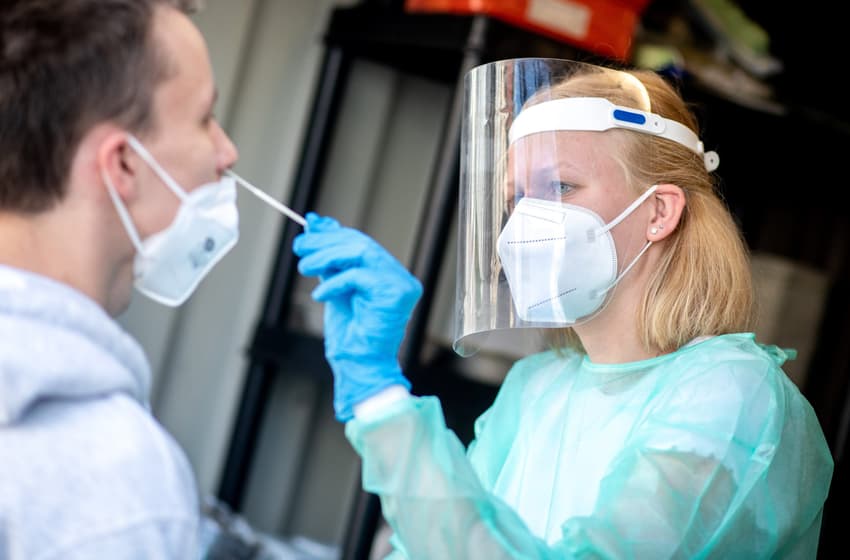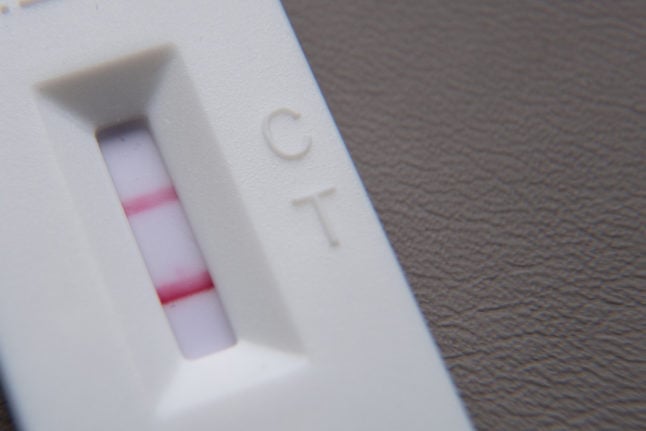EXPLAINED: The Covid rules in place across German states

Many Covid restrictions have been dropped in Germany, but some rules remain in place. And as infections increase again, it's important to be aware of what you should do if you get Covid.
Germany has relaxed or changed many Covid restrictions in recent months. However, with Covid infections rocketing again, people are reminding themselves of what rules remain in place, and what they have to do if they get a positive test.
Here's a quick roundup of what you should know.
Face masks
Covid masks have to be worn when travelling on public transport, including planes departing to and from Germany.
They also have to be worn in places where there are more vulnerable people, such as care homes, hospitals and doctor offices.
Masks are not mandatory anymore in shops (including supermarkets) and restaurants, but individual businesses can enforce the rule so watch out for signs on the door.
READ ALSO: Germany's current Covid mask rules
FFP2 masks have become the standard in Germany, but in some cases other medical masks are sufficient.
There are no longer any entry rules to public venues such as the 3G or 2G rule, meaning that people had to show proof of vaccination, recovery or a negative test.
However, they could return in autumn if the infection protection laws are adapted, and if the Covid situation gets worse.
Mandatory isolation
The rules on isolation differ from state to state, but there is one general requirement: those who test positive for Covid have to go into isolation at home and avoid all contact with people outside the household. The isolation period lasts at least five days or a maximum of 10 days.
If you get a positive result at home, you should go to a test centre and undergo a rapid antigen test. If it is positive, the quarantine obligation kicks in. If it is negative, you have to get a PCR test.
If you have Covid symptoms, you should contact your doctor, local health authorities or the non-emergency medical on-call service on 116 117. They can advise or whether you should get a PCR test.
Across German states, the isolation period lasts 10 days, but - as we mentioned above - there are differences on how it can end earlier.
In Berlin, for instance, it can be shortened from the fifth day with a negative test if you have been symptom free for 48 hours. If this isn't the case, the isolation is extended until you have been symptom-free for 48 hours and tested negative. But you can leave without a negative test after 10 days.

A positive Covid test. Photo: picture alliance/dpa | Sebastian Gollnow
Close contacts of people infected with Covid (including household contacts) no longer have to quarantine in Germany, but they are advised to get tested regularly and monitor for symptoms, as well as reduce contacts for five days.
As ever, check with your local authority for the detailed rules.
Travel
Germany recently provisionally dropped almost all of its Covid travel restrictions, making it much easier to enter the country.
The changes mean that entry into Germany is now allowed for all travel purposes, including tourism. The move makes travel easier – and cheaper – for people coming from non-EU countries, particularly families who may have needed multiple Covid tests for children.
People also no longer have to show proof of vaccination, recovery or a negative test against Covid before coming to Germany – the so-called 3G rule.
However, if a country is classed as a 'virus variant' region, tougher rules are brought in.
It is likely that travel rules could be reinstated again after summer or if the Covid situation gets worse so keep an eye on any developments.
READ ALSO: Germany drops Covid entry restrictions for non-EU travellers
Vaccine mandate
The mandate making Covid vaccinations compulsory for medical staff remains in place. A vaccine mandate that would have affected more of the population in Germany was rejected by the Bundestag in a vote in April.
READ ALSO: Germany's top court approves Covid vaccine mandate for health care workers
Workplaces
Masks are no longer mandatory in workplaces, unless it is in a setting where more risks groups are, such as hospitals or care homes.
The government no longer requires people to work from home, but employers and employees can reach their own 'home office' arrangement.
Tests are also no longer mandatory, but workplaces can offer their employees regular tests.
Comments
See Also
Germany has relaxed or changed many Covid restrictions in recent months. However, with Covid infections rocketing again, people are reminding themselves of what rules remain in place, and what they have to do if they get a positive test.
Here's a quick roundup of what you should know.
Face masks
Covid masks have to be worn when travelling on public transport, including planes departing to and from Germany.
They also have to be worn in places where there are more vulnerable people, such as care homes, hospitals and doctor offices.
Masks are not mandatory anymore in shops (including supermarkets) and restaurants, but individual businesses can enforce the rule so watch out for signs on the door.
READ ALSO: Germany's current Covid mask rules
FFP2 masks have become the standard in Germany, but in some cases other medical masks are sufficient.
There are no longer any entry rules to public venues such as the 3G or 2G rule, meaning that people had to show proof of vaccination, recovery or a negative test.
However, they could return in autumn if the infection protection laws are adapted, and if the Covid situation gets worse.
Mandatory isolation
The rules on isolation differ from state to state, but there is one general requirement: those who test positive for Covid have to go into isolation at home and avoid all contact with people outside the household. The isolation period lasts at least five days or a maximum of 10 days.
If you get a positive result at home, you should go to a test centre and undergo a rapid antigen test. If it is positive, the quarantine obligation kicks in. If it is negative, you have to get a PCR test.
If you have Covid symptoms, you should contact your doctor, local health authorities or the non-emergency medical on-call service on 116 117. They can advise or whether you should get a PCR test.
Across German states, the isolation period lasts 10 days, but - as we mentioned above - there are differences on how it can end earlier.
In Berlin, for instance, it can be shortened from the fifth day with a negative test if you have been symptom free for 48 hours. If this isn't the case, the isolation is extended until you have been symptom-free for 48 hours and tested negative. But you can leave without a negative test after 10 days.

Close contacts of people infected with Covid (including household contacts) no longer have to quarantine in Germany, but they are advised to get tested regularly and monitor for symptoms, as well as reduce contacts for five days.
As ever, check with your local authority for the detailed rules.
Travel
Germany recently provisionally dropped almost all of its Covid travel restrictions, making it much easier to enter the country.
The changes mean that entry into Germany is now allowed for all travel purposes, including tourism. The move makes travel easier – and cheaper – for people coming from non-EU countries, particularly families who may have needed multiple Covid tests for children.
People also no longer have to show proof of vaccination, recovery or a negative test against Covid before coming to Germany – the so-called 3G rule.
However, if a country is classed as a 'virus variant' region, tougher rules are brought in.
It is likely that travel rules could be reinstated again after summer or if the Covid situation gets worse so keep an eye on any developments.
READ ALSO: Germany drops Covid entry restrictions for non-EU travellers
Vaccine mandate
The mandate making Covid vaccinations compulsory for medical staff remains in place. A vaccine mandate that would have affected more of the population in Germany was rejected by the Bundestag in a vote in April.
READ ALSO: Germany's top court approves Covid vaccine mandate for health care workers
Workplaces
Masks are no longer mandatory in workplaces, unless it is in a setting where more risks groups are, such as hospitals or care homes.
The government no longer requires people to work from home, but employers and employees can reach their own 'home office' arrangement.
Tests are also no longer mandatory, but workplaces can offer their employees regular tests.
Join the conversation in our comments section below. Share your own views and experience and if you have a question or suggestion for our journalists then email us at [email protected].
Please keep comments civil, constructive and on topic – and make sure to read our terms of use before getting involved.
Please log in here to leave a comment.